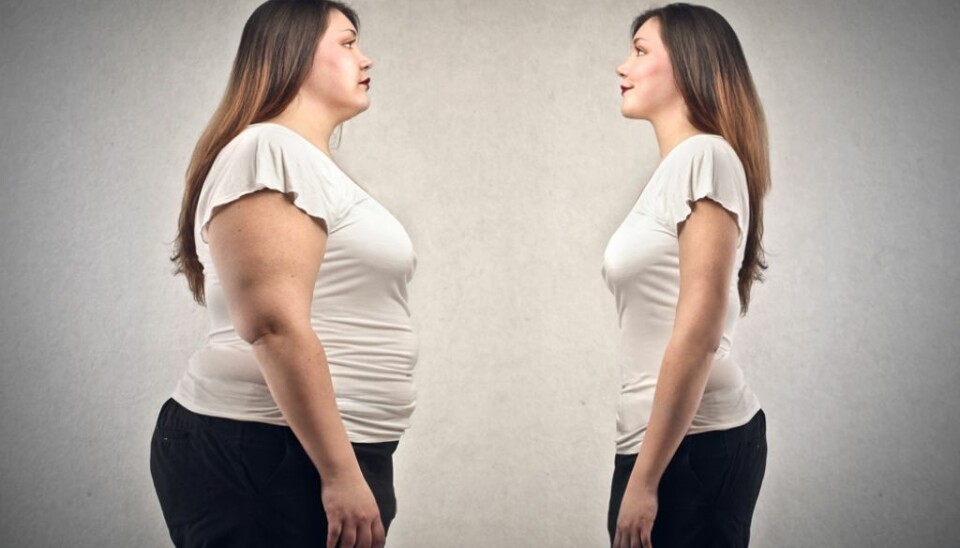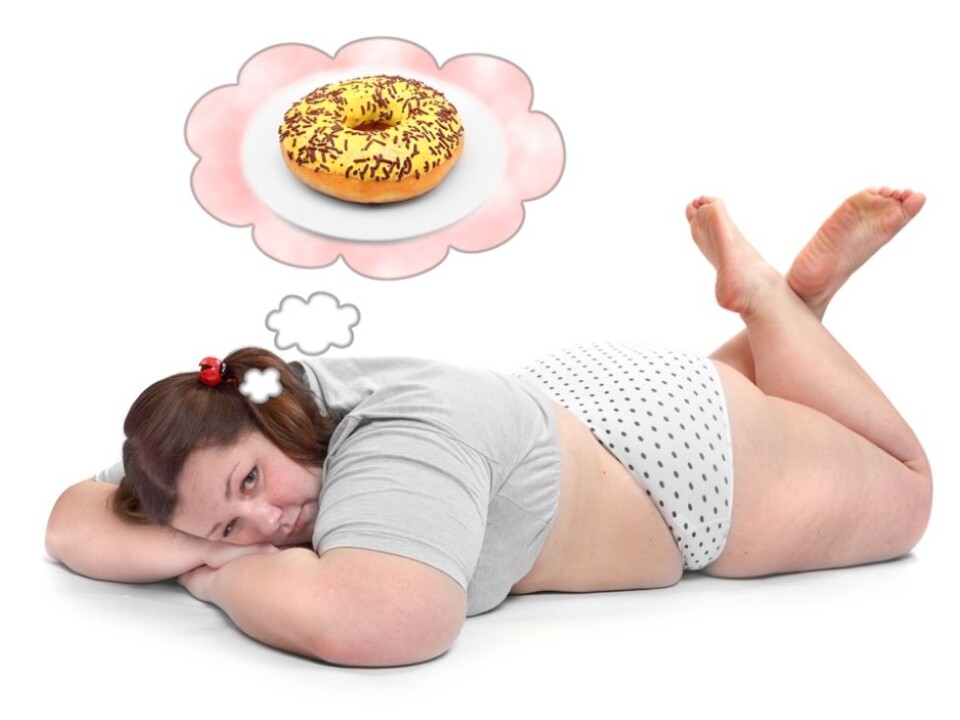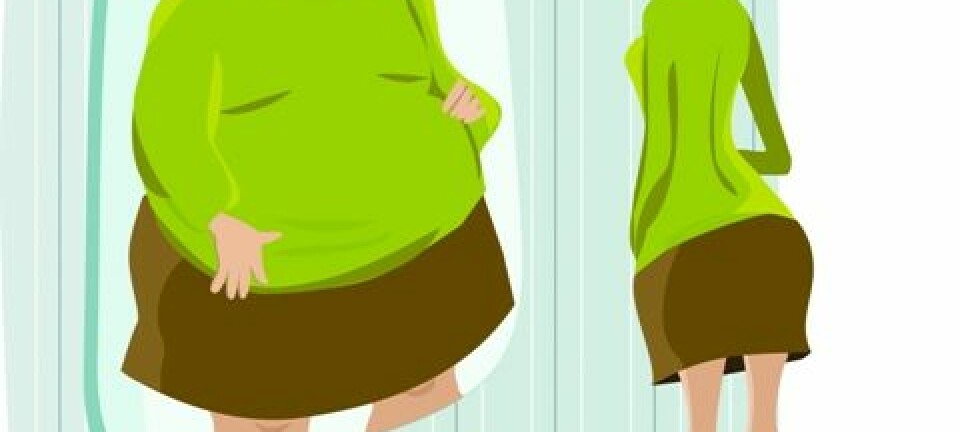
Overweight people are not lazy and dumb
Fat people face increasing discrimination round the world, and we accept it.
“Fat prejudice is well justified and should be encouraged. Self-respecting people don't let themselves gain those 50 pounds. Like it or not, it DOES say something about you as a person.”
So writes an indignant reader, just one of 491 who responded to a New York Times article about the research of Alexandra Brewis Slade on the increasing stigmatization of fat people round the world.
“The tone in many of the comments was just attrocious,” says Brewis Slade, who worked this spring at the Centre for Advanced Study (CAS), a foundation established by the Norwegian Academy of Science and Letters.
Many described how fat people take up too much space on the bus and bog down the health system at the expense of slimmer taxpayers.

One man commented that he would never consider having sex with a fat woman.
Another suggests, believe it or not, that fat people could come in handy, as their blubber could be used as biofuel when we’ve pumped up all the oil.
Would such diatribe be as widely tolerated if it were suggested that Jews or homosexuals could be put to such combustible use? Or if someone broadcasted their revulsion about the possibility of sex with a person of darker skin or, for instance, a disability?
Obviously not. So why is it apparently okay to heap ugly abuse on fat people?
Especially women
“A heap of studies show that obese people are stigmatized and discriminated against,” says a man who has researched the subject, Associate Professor Tor Ivar Karlsen of the University of Agder and the Morbid Obesity Centre at Vestfold County Hospital.

Such research tells us that many people think those who are fat are generally lazy, dumb, greedy and unmotivated.
Such stigmatization applies to heavy women in particular.
Obese people encounter direct and palpable discrimination, according to Brewis Slade.
Lower wages
“Studies from the USA show there is an income gap between fat and slim people, and that overweight people are less likely to be hired or promoted. Fat people are almost never the heroes in plots of movies. They are never the protagonists in a romance, but rather the clownish buddy.”
A study from 2013 shows that women in court are more apt to be considered untrustworthy and found guilty or if they are overweight.
Brewis Slade says that perhaps worse yet, fat people are also discriminated against in the health services.
Doctor sees the weight only
“Studies show that doctors are less willing to treat people who are obese than ones with normal weights. For instance fat women have been shown to be less likely to get a mammography or a cancer test by health personnel,” says Brewis Slade.
As a result these people might not be getting the medical help they deserve and need.
Much of the research has been conducted in other countries, but Tor Ivar Karlsen thinks there are no reasons to believe the situation is any better in Norway.
Brewis Slade even thinks Norwegians might be extra eager to cast the first stones.
“It’s very clear for from abroad that the Norwegian culture values fitness very highly,” she says.
Norwegians celebrate their famed polar explorers and sports idols. You can hardly leave your door without meeting a jogger in the latest training outfits and gear, she points out.
What impact does our attitude about such people have on the ones who don’t fit such ideals?
Because they deserve it
“In my experience lots of people have very fixed opinions that obesity is caused by laziness and a lack of self-restraint,” says one of Norway’s leading experts on fatness, Jøran Hjelmesæth of the Morbid Obesity Centre at Vestfold County Hospital and professor at the University of Oslo.
“They ‘know’ that by simply eating less and exercising more is all that’s needed, and are glad to talk about how they manage it themselves.”
Raising moral issues
Often the cause and the solution to the problem of overweightness and obesity is presented as a simple equation:
Weight = (calories in) – (calories out)
This notion is what legitimises stigmatization and discrimination of obese persons, asserts Brewis Slade.
When we assume that being fat or slim is a relatively easy option we turn the problem into a morality issue: Fat people are morally deficient and should be ashamed and get their act together.
As a result such bias and slurs become more acceptable.
There’s just one hitch: Science does not support the hypothesis that obesity has anything to do with moral decrepitude. The math is much more complicated than the arithmetic above.
Multiple factors
“Obesity has very little to do with laziness and immorality,” says Jøran Hjelmesæth.
The professor does not wish to undermine our individual responsibilities for our health, or deny that body weight can be regulated by changing food intake and activity levels. But there is so much more.
The brain, intestines, fatty tissue, muscles, organs and bacterial flora comprise a complicated system of constant communication among the various parts.
This system is guided by the feeling of hunger, fullness, appetite, enjoyment of food, metabolism and storage of fat.
We now know that genes have a lot to say for the regulation of these mechanisms. There can be greater individual differences in how the body system is fine-tuned.
Not disposed to fatness
Obviously our genes cannot have changed much since the obesity epidemic started about 30 years ago. But in countries like Norway the environment we live in has.
We now live in a wealthier society where high-calorie temptations abound and are accessible 24/7. Fewer do physically strenuous work and cars and a cornucopian output of appliances and contraptions eliminate much of the daily exercise people used to get. In other words it is much harder to stay slim.
But not everyone is equally vulnerable. The calorie bombs at the counter of the petrol station just can’t be resisted by everyone. Not everyone gains weight as readily, even if they are couch potatoes.
“We estimate that about a third of the population is not disposed toward putting on weight. They stay slim regardless of their lifestyle,” says Karlsen at the University of Agder.
The bodies of others put on fat much too easily.
Exercise gave lower and higher weight
“Nearly no one is alike in their responses to food and exercise,” says Professor Bård Kulseng at the Norwegian University of Science and Technology (NTNU) in Trondheim. He is a veteran in research on treating overweightness and obesity.
He refers to a study of how work-outs affect relatively untrained obese persons.
The researchers in the project ensured that the participants received identical amounts of physical activity. They engaged in exercise which should have burned 500 calories, straining themselves at 75 percent of their maximum capacity, five days a week for over three months. Food intake and everything else was controlled and the same for all of them. But the results were far from it.
“Some people enjoyed a huge benefit. They lost as much as 15 kilos. Most lost at least some weight. But others actually gained. This has also been confirmed in other studies.”
The different ways our bodies react caused these disparities.
Unfair
When we take these huge differences into account our views of obesity are shown to be based on misconceptions.
“A person who gets a super effect from exercising will get lots of praise for following the recommended steps to ward off obesity,” says Kulseng.
But a person who trains just as much without getting the same effect will soon be subjected to suspicion. Is this person actually skipping the activity regimen?
“This is unfair,” says Kulseng.
On the assumption that we are all alike, we think we can all achieve the same results. We readily conclude that those who cannot stay slim lack self-control and stamina.
Kulseng thinks we should abandon any notions that one type of treatment works for everyone who is overweight or obese.
Stigmatization does harm
This uproots any justifications for stigmatizing or discriminating against people on the grounds of overweight problems.
If it is truly arduous for some fat people to slim down, they should not be accused of taking up space, overloading the health services or needing special utilities.
On the contrary, Brewis Slade at the CAS says research indicates that stigmatization can reinforce and perpetuate the problem, as there are so many mechanisms at work.
Shame raises the risk of overeating and can also raise the threshold for going out to get exercise in a neighbourhood where slim-body ideals prevail. The stress of being ostracised can also trigger chemical changes in the body that lead to more storage of fat.
“It contributes to the suffering of obese people. It is very stressful to feel that you don’t live up to social norms,” says Brewis Slade.
——————
Read the Norwegian version of this article at forskning.no
Translated by: Glenn Ostling


































